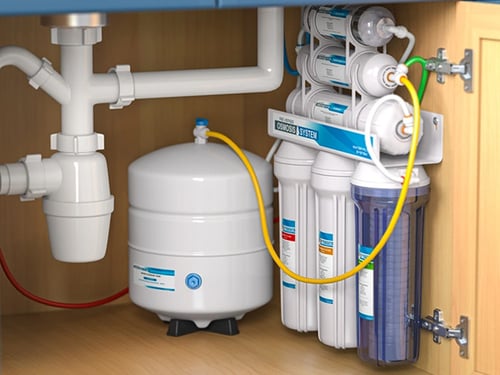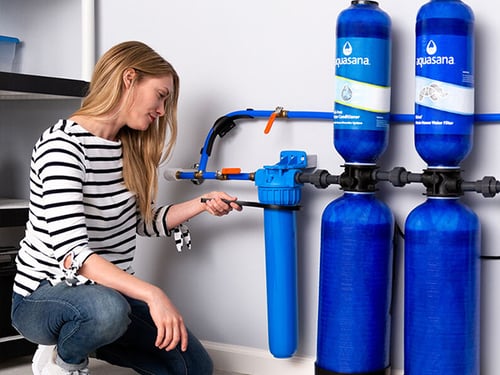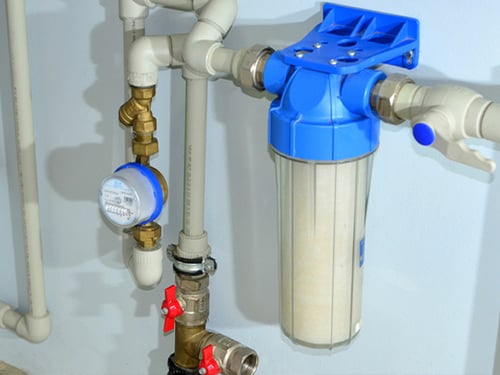The importance of maintaining water quality cannot be underestimated. Clean water is not only essential for our health, but also plays an important role in preserving the environment. One effective way to ensure water quality is by using a water filter. Water filters work by capturing unwanted particles and contaminants, making the water we consume cleaner and safer. In this modern era, water filter technology has come a long way, offering practical solutions to various water quality issues. Through this article, we will dig deeper into the benefits of water filters, how to choose the right filter, and its role in supporting health and environmental sustainability.

Water Filter Definition and Function
A water filter is a device designed to clean water by removing contaminants and unwanted particles through various filtration methods. With the ability to capture and eliminate various types of contaminants, ranging from sediment, chlorine, bacteria, to heavy metals, water filters are an essential component in a clean water supply system. Not only that, some advanced water filters are also capable of improving water quality by adding essential minerals that are beneficial for health.
Various types of water filters are available in the market, each with different mechanisms of action and effectiveness. For example, an activated carbon filter works by absorbing organic contaminants and chlorine, while a reverse osmosis filter works by forcing water through a semi-permeable membrane to remove contaminants down to microscopic size. Choosing the right type of filter depends on the type and level of contamination of the water to be filtered as well as the specific needs of the user.
The primary function of a water filter is to provide safe and clean water for a variety of purposes, including consumption, cooking, and personal hygiene. By removing harmful contaminants and improving the organoleptic quality of water (taste, odor, and color), water filters play a crucial role in maintaining the health and well-being of families. In addition, the use of water filters also contributes to the reduction of bottled water usage, which further supports environmental conservation efforts by reducing plastic waste.
In the context of Indonesia, where water quality issues are a major concern in many regions, the implementation of water filter technology is an important step in ensuring access to clean and safe water for every level of society.

Water Filter Benefits for Health
Using a water filter has a variety of significant benefits for human health. Filtered water can reduce the risk of diseases related to water contaminants, such as diarrhea, cancer, and skin problems. This is because filters are effective at eliminating pathogens such as bacteria, viruses, and parasites, as well as harmful chemical contaminants such as lead and mercury that can cause poisoning.
In addition, clean water is a great way to reduce the risk of waterborne illnesses.
In addition, clean and safe water is also essential to support optimal organ function. Good hydration is essential for digestion, nutrient absorption, and detoxification of the body. Consumption of clean, quality water can help boost the immune system, prevent dehydration, and support healthy skin by keeping it moisturized and elastic.
Consumption of clean, quality water can help boost the immune system, prevent dehydration, and support healthy skin by keeping it moisturized and elastic.
Another benefit of using a water filter is the improved taste quality of drinking water. Water containing chlorine and other contaminants often has an unpleasant taste and odor. By removing these contaminants, water filters ensure that drinking water is not only safe but also fresher and tastier to consume. This encourages greater water consumption, which is an important aspect of a healthy lifestyle.

Benefits of Water Filters for the Environment
The use of water filters is not only beneficial to health but also has a significant positive impact on the environment. One of the main benefits is the reduction in the use of plastic bottles. By choosing to use filtered water at home or at work, we can reduce reliance on bottled water, which in turn reduces plastic waste. Plastic waste is one of the biggest environmental problems in the world, including in Indonesia, contributing to ocean pollution and ecosystem damage.
In addition, water filtration systems can reduce the amount of wastewater produced. Some traditional filtration methods produce wastewater in the process. However, modern water filter technologies, such as reverse osmosis, are designed to be more efficient, reducing the amount of water that is wasted.
The use of water filters also encourages the use of water filters.
The use of water filters also encourages more sustainable management of water resources. By cleaning local water for daily use, we reduce pressure on clean water sources and help maintain the balance of local ecosystems. This is especially important in Indonesia, where clean water distribution is often a challenge, and preservation of water sources is a priority.

Choosing the Right Water Filter
In choosing the right water filter, several factors should be considered to ensure that you get a water filtration solution that meets your specific needs. First, identify the main contaminants in your water source. Different water sources have a variety of contaminants, from heavy metals like lead and mercury, to bacteria and viruses. Understanding these contaminants will help you choose the most effective filter type.
Secondly, consider the size and capacity of the filter. For household needs, you may need a filter system that can treat large volumes of water every day. Meanwhile, for personal or portable use, a small size water filter may be more practical.
Third, evaluate the features and capacity of the filter.
Third, evaluate the features and technologies offered. Some advanced water filters include additional features such as a remineralization system that adds essential minerals back into the water, or an indicator that tells you when the filter needs to be replaced.

Adopting a water filter system is an important step not only in improving the quality of health through the consumption of clean and safe water, but also in contributing to environmental conservation. With a wide range of benefits on offer, from reducing the risk of disease to supporting conservation efforts, it is important to choose the right water filter that suits your needs.
Choosing to invest in a quality water filtration system is choosing for a healthier and greener future for us all.
